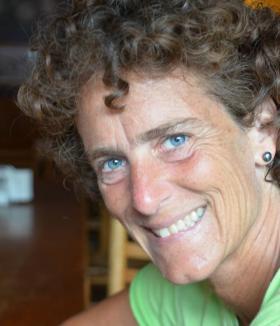The following commentary by Linda Wheatley was written for Vermont Public Radio and aired on October 9, 2013. Listen to the commentary by visiting VPR’s website.
 Last year, a friend and I walked from Stowe to Washington DC. – six hundred miles over six weeks. We wore brightly-colored t-shirts with slogans like “Life, Liberty and (dot dot dot)…,” and our mission was to invite people to talk about the pursuit of happiness, what happiness means to them, and what really matters in life.
Last year, a friend and I walked from Stowe to Washington DC. – six hundred miles over six weeks. We wore brightly-colored t-shirts with slogans like “Life, Liberty and (dot dot dot)…,” and our mission was to invite people to talk about the pursuit of happiness, what happiness means to them, and what really matters in life.
The most common response we heard was family. At a farm stand in Massachusetts, a mother described the impact of her extended family on the region and her son talked about taking over the family farm. Our host family in Pennsylvania, with four young children, spoke of building tree houses and of holidays. Family, intimate partners, children, relationships and love were clearly what matters most to these Americans.
The second most common response had to do with service: making others happy, taking care of neighbors, participating in community activities, helping out a friend.
In Waterbury, we literally stumbled into a proud and energized Randall Street picnic, celebrating the one year anniversary of Hurricane Irene. There, the conversation was all about community resilience and neighbors caring for neighbors.
In Barnard, we found ourselves at a gathering of locals, who were trying to rescue the general store that had recently closed. Each morning, over donated coffee and muffins they tapped away in a circle of laptops, writing articles and grant proposals. And they succeeded. The Barnard General Store has reopened under the Barnard Community Trust.
On our walk, we also heard about health, opportunity, nature, music, pets, meaningful work, security, freedom and more.
Just talking about happiness seems to make people happy. These conversations are empowering – and critical – in helping us become aware, as a society, of the gap between progress indicators that really tell us how we’re doing and those that only imply progress and well-being. We must become smarter consumers of progress indicators.
You get what you measure, apparently and we’re getting the same things sought when we started watching Gross Domestic Product, or GDP, after World War II. We hear about GDP, and other economic indicators, as if they offer a meaningful scorecard for the state of our nation. And these indicators do have their place, but they tell us nothing about the state of our children, our communities, our forests, or our democracy.
Currently, Vermont is the first state in the nation to legislate the use of an expanded set of measures in policy-making. The Genuine Progress indicator, or GPI, focuses on aspects of distribution, well-being, and sustainability, which are critical for the state’s prosperity but poorly reflected in conventional measures of growth.
The Pursuit of Happiness Walk reassured me that happiness remains our common pursuit and that we know what matters. The well-being of our families and the basic vitality of our communities should be the primary focus of our economic and social policies. We need to measure what matters.






